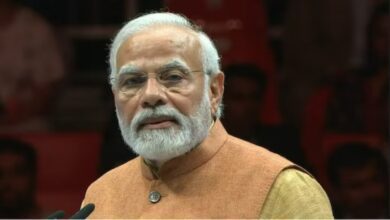Institutional safeguards against donor privacy must be found: CEC on ending the electoral bond program
Chief Election Commissioner (CEC) Rajiv Kumar stated on Saturday that while the government was in favor of transparency in matters of political funding, the nation needed an institutional mechanism to protect the donor’s privacy. This came days after the Supreme Court chastised the State Bank of India (SBI) for failing to provide the data on political funding through electoral bonds with unique alphanumeric numbers, which could help identify the bond.

“Since we stated our position in front of the esteemed Supreme Court, the Commission has always supported openness. There is no place for concealing things in a democracy. Democracy is all about ensuring that everyone is informed, conscious, and has access to the necessary data. Election bond data has to be disclosed. At a news conference in the nation’s capital on Saturday, Kumar declared the complete calendar or roster for the Lok Sabha elections, to which everyone in attendance agreed.
Nonetheless, the CEC made clear that safeguarding contributors’ privacy must also be taken into account and that a formal system must be established to make sure of this. “The country now also has to ask and find a solution by way of an institutional mechanism where the donor’s privacy is not compromised,” said the CEC.
Kumar said, “We have made it compulsory for all political parties to declare the donations they are receiving,” outlining the steps the Election Commission has taken to investigate the potential use of black money by political parties during elections. It is mandatory for all political parties to submit statements to us on the donations they receive.”
Additionally, the amount that they have raised (via contributions) and the amount that they have spent must be disclosed in the yearly reports. Additionally, they are required to report to us the amount of money they spent on each election once it has concluded. We post everything on our website so that everyone is aware of the developments,” he said. The CEC emphasized that while the poll authority controls “unaccounted form” donations during elections, it still has to figure out a means to regulate black money contributions.
“We are really concerned about monitoring the unaccounted money that is utilized in elections. However, simultaneously, the whole country has to collaborate on how we manage unreported donations,” Kumar said. “How the donor’s privacy is also protected, he is not harassed, how it is channeled, how it is more and more white,” he said.
The CEC also noted that a “better system” for facilitating political contributions that protects contributors’ privacy must be developed since the economy in the digital era should be less cash-based. One must consider that the economy in the digital era must be less cash-based. A better system will undoubtedly develop, according to Kumar.
In a decision from February, the Supreme Court declared that the Center’s Electoral Bond Scheme, which allowed political parties to receive funds anonymously, was invalid and directed the SBI to cease issuing Electoral Bonds right now. It had requested that SBI provide information on every electoral bond that parties had redeemed, including the bond’s amount and the date of encashment.
The top court denied SBI’s request on Monday to extend the deadline for submitting information on electoral bonds to the Election Commission until June 30. Instead, the court ordered the bank to provide the information by March 12. The top court also ordered the poll panel to gather the data that has to be provided by the SBI and post the information by 5 p.m. on March 15, 2024, on its official website.
The chairman of State Bank of India informed the Supreme Court on Wednesday in an affidavit that the Election Commission has received the date of purchase of each electoral bond, the buyer’s name, and the denomination of the bond they purchased in accordance with the court’s order. The Commission said on Thursday that it has published the electoral bond data from SBI on its website “as is where is basis” in accordance with the Supreme Court’s directive.
Any person, business, organization, or corporation that is an Indian citizen or that has been formed or founded in India is eligible to acquire an electoral bond, which is an instrument similar to a promissory note or bearer bond. The goal of the bonds’ issuance is to raise money for political parties.







